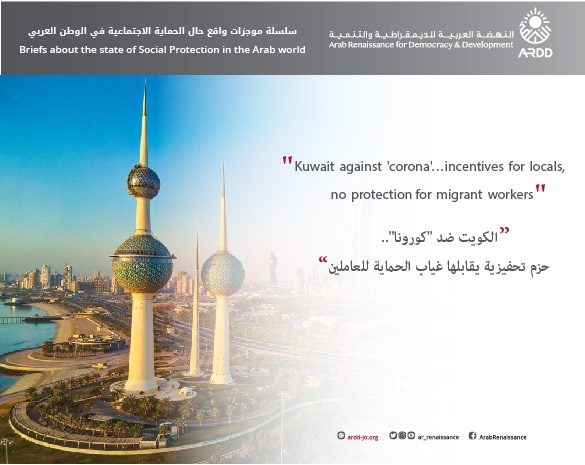“Conclusive, rapid, and comprehensive” is how the World Health Organisation (WHO) described Kuwait’s response to the Covid-19. The country had taken strict preventive measures since its first confirmed coronavirus case at the end of February.
In parallel with the steps Kuwait took to face the coronavirus, the country took many measures to mitigate the economic and social consequences of the pandemic whose toll so far is 56,877 confirmed cases and 399 deaths.
Among the steps taken: delaying loans taken by firms affected by the crisis and giving incentives to the main sectors, and to small- and medium-size businesses in the country[i].
As part of its series of briefs about the reality of social protection in the Arab world, Arab Renaissance for Democracy and Development (ARDD) sheds lights on Kuwait’s actions and responses to Covid-19, as well as on the measures it took to protect vulnerable groups, such as the poor, the elderly, children, migrants, refugees and people with disabilities.
As a first step towards helping the economy recover after Covid-19, Kuwait published a plan for catalysing economic revival by giving $1.5 million worth of facilities to small- and medium-size business owners. The measure was taken to offset the severe losses to the Kuwaiti economy and the serious budget deficit brought about by the pandemic, which forced businesses to close and brought incomes down, especially when oil prices started to decline[ii].
Most migrant workers were affected by pandemic; hundreds of thousands were laid off, and the areas where they reside are still being quarantined, which prevents them from going to work and, as a consequence, from being paid[iii].
The corona crisis also created hostility against migrant workers in Kuwait, besides the loss of job security following statements announcing the decision to reduce their numbers. Social media users viciously attacked migrant workers with Egyptians getting the lion’s share of attacks after illegal migrant workers in shelters demonstrated in May against what they perceived as a slow evacuation process by Egyptian state [iii].
According to the Central Statistics. Bureau in Kuwait, there are around 2.18 million workers in the country, of which Indians constitute 27%, with 578,000 workers, followed by Egyptians, with 2,251,800, and Kuwaitis who rank third and constitute 19% of the workforce, with 408,200 or 4,082,000 since I cannot figure out from the number as it is written what we are talking about, so please make light of it], 9%, or 185,400 Bengalis, 4% each of Pakistanis and Filipinos, 3% Syrians, and the rest of other nationalities [iii].
Institutions and organisations in Kuwait launched many initiatives to protect people with disabilities from the consequences of the virus pandemic, such as providing them with food items and launching the “We stand with you” campaign in a partnership of the public and private sectors and civil society organisations[iv].
Kuwait also worked to spread awareness and provide mental and physical health support to people with disabilities, activated a hotline and provided remote psychological, educational, family and treatment consultations[iv].
Among the prisoners in the central prison, 268 cases were confirmed, which prompted human rights defenders to demand the release of some of them to avoid the spread of the virus and loss of control over its ravages[v].
The “In support of Kuwait” campaign, launched by the International Islamic Charity Organisation and 41 other charities, collected more than 9 million Kuwaiti dinars ($30 million) to support efforts to fight the coronavirus. Around 200,000 people made donations in response to calls for solidarity with all groups of the community to fight corona[vi].
Kuwaiti women’s role was prominent during the crisis, whether in the community or in civil society organisations. They provided support in cases of domestic violence, faced by some women due to the need to maintain physical distancing. There are growing demands to issue legislation targeting gender-based violence in Kuwait, to help maintain mental health and to provide consultations for women[vii].
While Kuwait is fighting the coronavirus, the public, civil society and human right defenders call on the government to protect migrant workers, especially the ones with unique specialisations, such as oil engineers, technicians in the energy sector, doctors, nurses, technicians in the medical sector, construction workers and teachers.
[i] Analysis, Kuwait faces corona with exceptional measures to mitigate its consequences
[ii] Debates in Kuwait re economic revival
[iii] Dangerous effect of laying off workers in Kuwait
[iv] The “We stand with you” campaign to support people with disabilities
[v] Demands to release prisoners in Kuwait amid fear of the spread of corona


